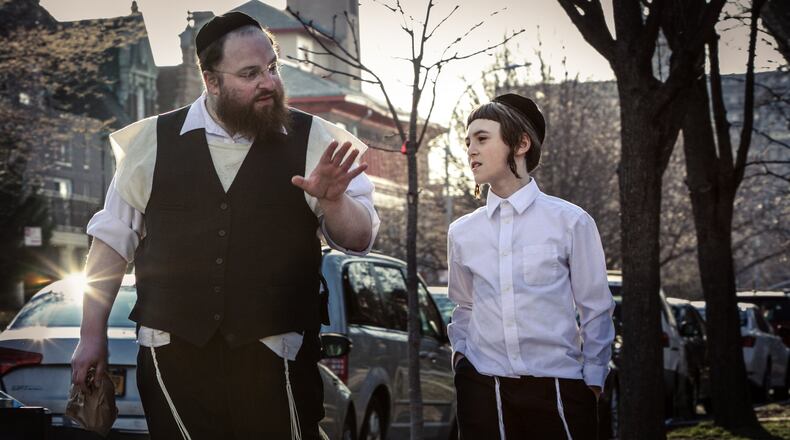Yiddish is a language without a homeland. Once spoken by Jews almost everywhere in the world, it’s used today largely by the ultra-orthodox in hermetic communities that insist on keeping outsiders at arm’s length. Which is one reason why “Menashe” is such an unusual accomplishment.
Starring nonprofessional Yiddish-speaking actors from haredi communities in Brooklyn’s Borough Park and Crown Heights neighborhoods, “Menashe” is filmed in that language, though director/co-writer Joshua Z. Weinstein did not speak it. It’s a gentle, melancholy father-and-son story that’s as notable for an evocation of its self-contained world as it is for its drama.
As written by Weinstein, Alex Lipschultz and Musa Syeed, “Menashe” is loosely based on the life experience of its star, Menashe Lustig, who has something of a YouTube presence in the Hasidic world.
The film’s Menashe is a man of a certain age, not exactly svelte as he strides into the frame headed for work as a cashier and man-of-all-jobs at a small local supermarket.
Menashe prays at a small neighborhood stiebel, and the word of his rabbi (convincingly played by Meyer Schwartz, a taxi driver in real life) is law to him. Though Menashe is hardly a rebel, there is one area where his life goes against the grain.
For in a world where family is paramount, Menashe is a widower, and the film introduces him almost a year after his wife, Leah, has died.
Despite pressure from the rabbi, who reminds him that “the Talmud says beginnings are hard,” he is, as an abortive arranged meeting with an eligible woman points out, completely uninterested in remarriage. Which is where things get complicated.
For Menashe is also the father of a pre-teen boy named Rieven (Ruben Niborski), and the cultural norm of this community mandates that children be raised in two-parent families. So Rieven lives, at the rabbi’s insistence, with the family of Leah’s brother, Eizik (Yoel Weisshaus), a humorless, holier-than-thou prig who has visible contempt for Menashe’s shambling lifestyle.
Nothing in this world is more important to Menashe than his son. He can’t make peace with having to give him up until he remarries, and it breaks his heart not to see the boy more than Eizik’s strict rules allow. But to try and raise Rieven alone in opposition to the community’s norms would risk his son’s expulsion from school and inflict pariah status on him.
Weinstein dealt with the language difference by having his cast rehearse scenes in English before filming in Yiddish, and the poignancy of the central situation never fails to come through. As a slice of ultra-orthodox life, “Menashe” offers an unusual — and unusually sympathetic — look inside a world that is often hidden from view.
MOVIE REVIEW
“Menashe”
Grade: B
Starring Menashe Lustig and Ruben Niborski. Directed by Joshua Z. Weinstein.
Rated PG for thematic elements. Check listings for theaters. 1 hour, 21 minutes.
Bottom line: An unusual and sympathetic look inside a hidden world
About the Author
Keep Reading
The Latest
Featured


